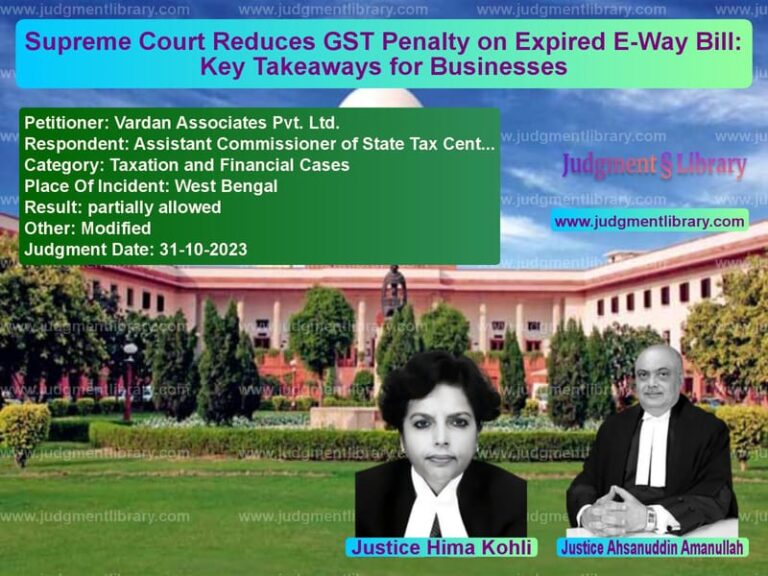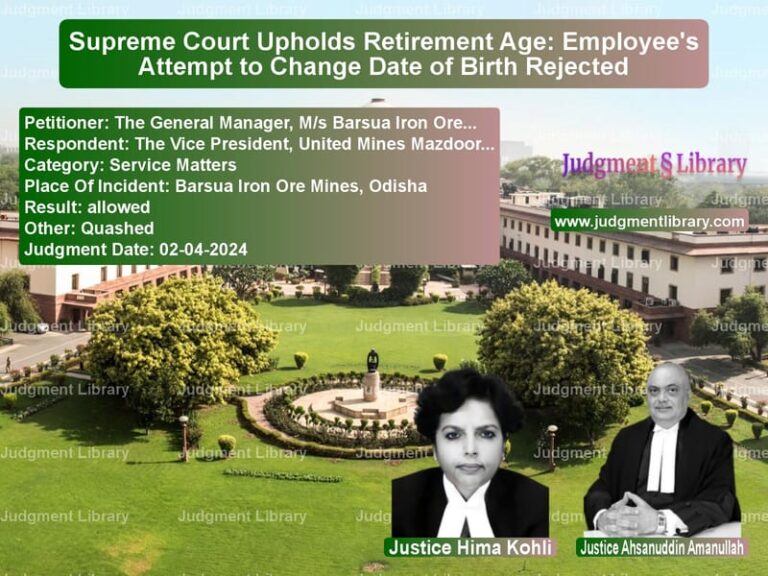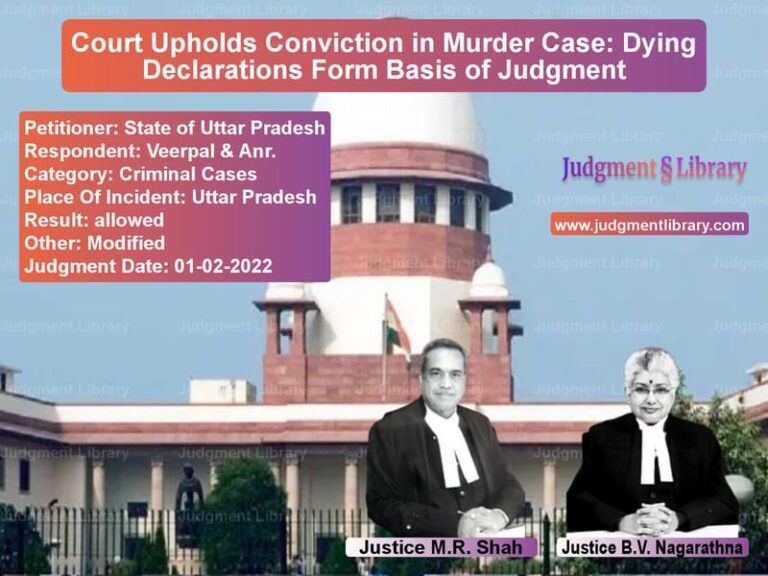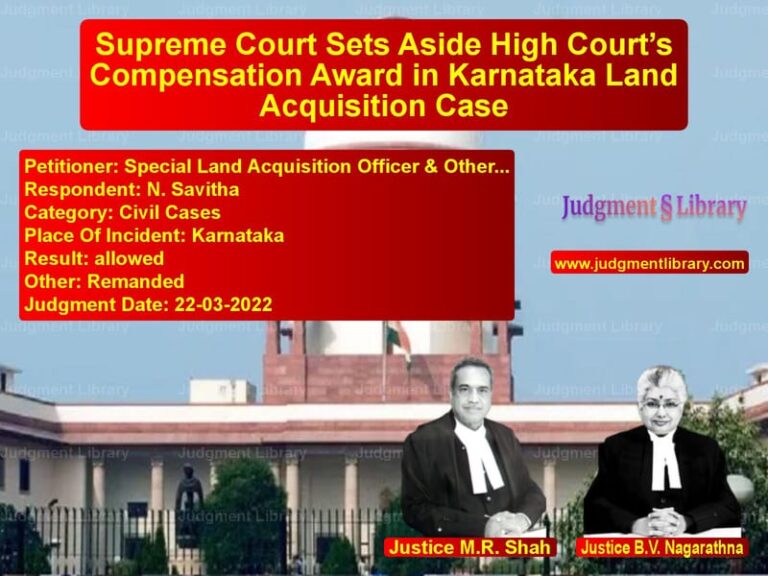Supreme Court Rules on Conditional Sale Deed: Right to Repurchase Can Be Assigned
The case of Indira Devi v. Veena Gupta & Others revolved around a dispute concerning a conditional sale deed executed in 1977. The Supreme Court ruled that a right to repurchase property, as outlined in a conditional sale deed, is not a personal right and can be assigned unless explicitly restricted in the agreement.
Background of the Case
The dispute originated when Kaleshwar Prasad Singh became a tenant of a property owned by Kishori Lal Sahu. Later, on August 5, 1977, Sahu and his son executed a conditional sale deed in favor of Indira Devi for Rs. 5000. The deed contained a clause allowing the vendors (Sahu and his son) to repurchase the property if they returned the full amount by July 1984. If the amount was not repaid within this period, Indira Devi would become the absolute owner of the property.
Key Developments in the Dispute
- February 14, 1983: Kishori Lal Sahu executed a gift deed in favor of his daughter-in-law, Veena Gupta, assigning her the right to repurchase the property.
- 1983: Veena Gupta and Kishori Lal Sahu filed a civil suit seeking specific performance of the repurchase clause, claiming they were willing to return Rs. 5000.
- March 1984: The plaintiffs sought permission from the court to deposit Rs. 5000, which was granted.
- April 29, 1984: The amount was deposited in court, fulfilling the condition for repurchase.
- September 27, 1986: The Trial Court dismissed the suit.
- January 27, 2000: The lower appellate court upheld the Trial Court’s decision.
- September 26, 2013: The Patna High Court reversed the lower court rulings, allowing Veena Gupta to enforce the repurchase clause.
- July 4, 2023: The Supreme Court upheld the High Court’s ruling, affirming that the right to repurchase was assignable and not limited to the original vendor.
Arguments Presented
Appellant’s Arguments (Indira Devi)
Indira Devi, represented by counsel, argued that:
- The right to repurchase in a conditional sale deed was personal and could not be assigned to a third party.
- The gift deed executed by Kishori Lal Sahu in favor of Veena Gupta was not valid since it involved consideration.
- The civil suit for specific performance was not maintainable because it combined multiple reliefs—specific performance and tenancy claims.
Respondent’s Arguments (Veena Gupta)
Veena Gupta, represented by her counsel, countered that:
- The gift deed explicitly granted her the right to repurchase the property.
- The sale deed did not state that the repurchase right was personal and therefore, it was assignable.
- The amount of Rs. 5000 was deposited in court within the stipulated time, fulfilling the sale deed condition.
- The High Court had rightly corrected the lower courts’ errors.
Supreme Court’s Analysis and Judgment
The bench, comprising Justices Abhay S. Oka and Rajesh Bindal, ruled in favor of Veena Gupta and upheld the High Court’s decision.
Key Observations of the Court
1. The Right to Repurchase is Assignable
“Unless the terms of the contract specifically restrict assignment, the right to repurchase is assignable and can be enforced by the assignee.”
The Court emphasized that no clause in the conditional sale deed prevented assignment, making Veena Gupta’s claim valid.
2. The Sale Deed Did Not Create a Personal Obligation
“A contract of repurchase that does not expressly limit the right to the original vendor is presumed assignable.”
The Court held that Indira Devi could not claim that the repurchase right was personal to Kishori Lal Sahu without clear contractual language stating so.
3. The High Court Correctly Reversed the Lower Court’s Rulings
“The lower courts erred in interpreting the nature of the transaction. The High Court correctly applied the law to enforce the repurchase clause.”
The Supreme Court found that the lower courts wrongly assumed the repurchase right was personal.
Final Ruling
The Supreme Court dismissed Indira Devi’s appeal and upheld the High Court’s judgment. It ruled that Veena Gupta was entitled to enforce the repurchase clause, affirming:
“For the reasons mentioned above, we do not find any error in the judgment of the High Court. The present appeal is accordingly dismissed.”
Impact of the Judgment
This ruling has significant implications:
- Clarifies Property Law: Establishes that repurchase rights in a sale deed are not inherently personal unless explicitly restricted.
- Prevents Unjustified Ownership Claims: Ensures that buyers cannot deny repurchase rights when properly assigned.
- Strengthens Specific Performance Claims: Reinforces the enforceability of sale conditions through legal action.
- Protects Beneficiaries of Assigned Rights: Upholds the legitimacy of assignments in property transactions.
Conclusion
The Supreme Court’s decision in Indira Devi v. Veena Gupta is a landmark ruling in property law, ensuring that conditional sale agreements are interpreted fairly. The ruling affirms that unless explicitly restricted, the right to repurchase property can be assigned and enforced by the assignee. This decision strengthens contractual clarity and protects legitimate property rights.
Petitioner Name: Indira Devi.Respondent Name: Veena Gupta & Others.Judgment By: Justice Abhay S. Oka, Justice Rajesh Bindal.Place Of Incident: Patna, Bihar.Judgment Date: 03-07-2023.
Don’t miss out on the full details! Download the complete judgment in PDF format below and gain valuable insights instantly!
Download Judgment: indira-devi-vs-veena-gupta-&-others-supreme-court-of-india-judgment-dated-03-07-2023.pdf
Directly Download Judgment: Directly download this Judgment
See all petitions in Contract Disputes
See all petitions in Property Disputes
See all petitions in Specific Performance
See all petitions in Judgment by Abhay S. Oka
See all petitions in Judgment by Rajesh Bindal
See all petitions in dismissed
See all petitions in supreme court of India judgments July 2023
See all petitions in 2023 judgments
See all posts in Civil Cases Category
See all allowed petitions in Civil Cases Category
See all Dismissed petitions in Civil Cases Category
See all partially allowed petitions in Civil Cases Category







